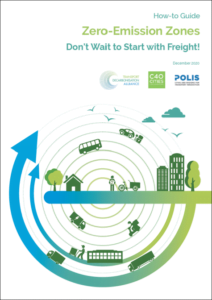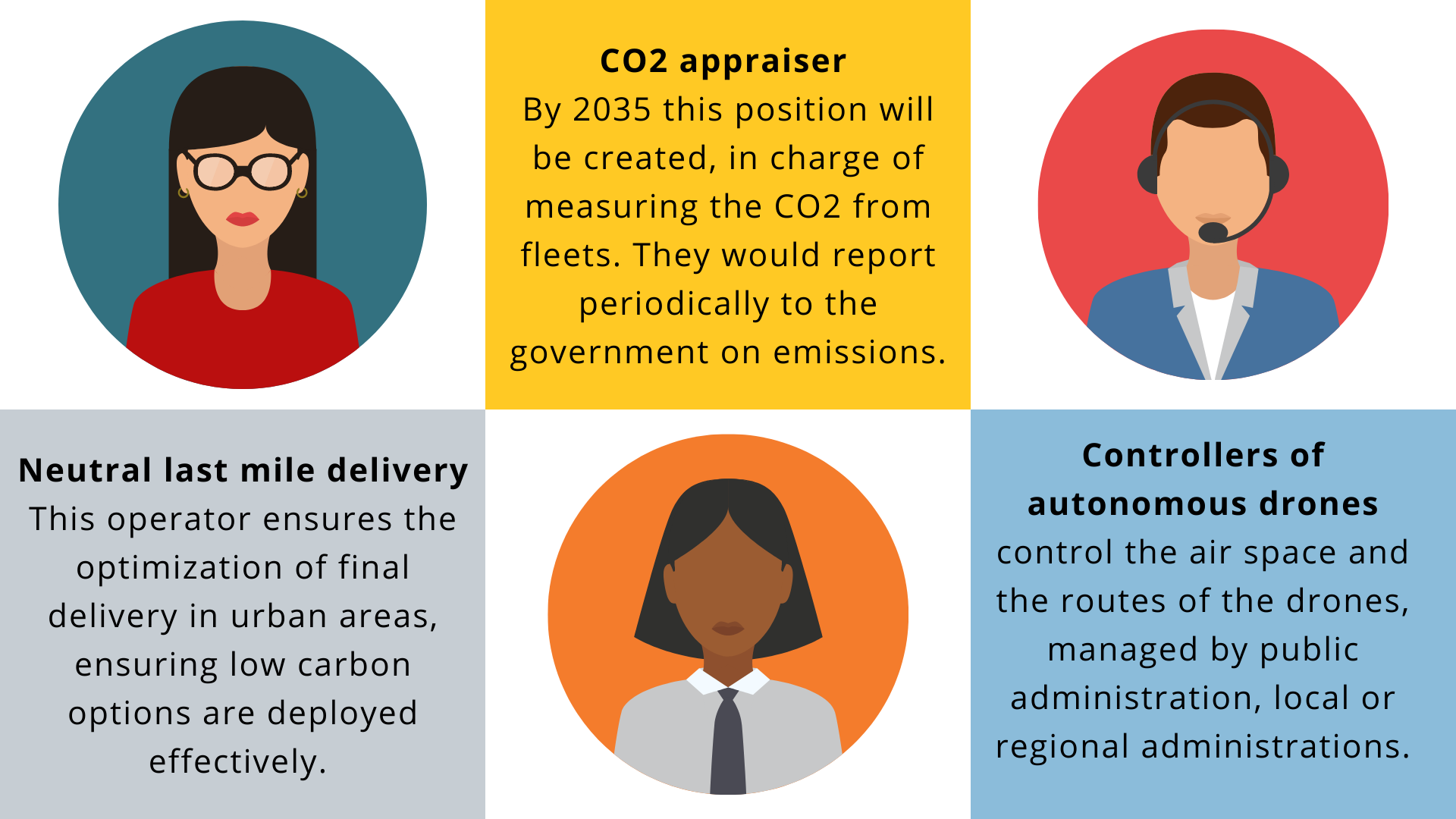The next generation of urban freight: can we deliver the skills?
As cities and the industry seek to grapple with the changing human resources required to deliver new logistics solutions, POLIS explored the challenges ahead and how we can bridge the capacity gap.
Urban freight has undergone a transformation over the last decade. With the explosion of e-commerce cities have become ground-zero for last mile distribution solutions. The sector is almost unrecognisable from ten years ago. You can now order groceries to your door in 10 minutes flat, while drone technologies are already being trialled across Europe.
All this change has had repercussions for the human resources required. Jobs have changed, some have been lost and many more gained. This is an issue igniting much debate across the logistics sector; however, many questions remain unanswered. What are the main trends? Which new skills will be required? And how to we fill these gaps?
In collaboration with Breda University, POLIS brought together speakers from the industry, local authorities and academia to address these challenges… and more!
The challenge
“Jobs are continually being created, but it requires careful consideration about how we reorganise our activities,” said Susana Val, the Director of Zaragoza Logistics Center (ZLC).
“The pandemic has uprooted and revolutionised logistics, so this is the moment to start thinking about what this means for human resources and how we engage all stakeholders across the industry in this conversation.”
Lola Ortiz, General Director of Planning and Mobility Infrastructures for Madrid, and chair of POLIS’ Urban Freight working group, agreed, noting the way Madrid has been seeking to source new skills.
Madrid is participating in a range of european freight projects and has been at the forefront of trialling new solutions. Actions such as the logistics microhub in the facilities of the underground parking of the Plaza Mayo - a collaboration between the Municipal Transport Company of Madrid (EMT) and CITYlogin- are transforming the way goods a moved across the supply chain.

POLIS member cities are taking action
Partnerships
These changes have required local authorities to work with industry stakeholders in new- and often unchartered- ways.
New players are continually emerging on the logistics scene, from instant grocery delivery apps to micro-locker operators. At the same time new partnerships are being forged, creating exciting opportunities for distributing goods across the city- and beyond.
As a result, collaborative skills are going to be critical, as employees will need to be able to forge and maintain cross-sector relationships.
This is something POLIS’ collaboration with ALICE has repeatedly revealed, as industry and local authorities put their heads together to discuss how they can best pool their resources. Indeed, joining the World Economic Forum, industry actors and member cities, POLIS has simultaneously been examining how such partnerships are playing out across Europe.
Nonetheless, cities remain key stakeholders in these processes- their activities defining the trajectory of freight. Therefore, upgrading the skills of their own employees is indispensable.
“In the past, public authorities did not prioritise urban freight, now they are realising logistics need to be integrated into sustainable mobility plans, this is an entire mental shift!” asserted Val.
“They must be able to promote and accelerate technological change through economic incentives and regulations to prevent access of polluting vehicles to the most sensitive areas.”
Going green isn’t as simple as it sounds
At the same time public authorities and the logistics industry are under growing pressure to reduce carbon emissions from freight, finding new ways to accommodate growing demand in a greener- more efficient- way.
 Urban freight is responsible for 25% of CO2 from urban transport, representing 10 to 15% of vehicle equivalent miles travelled on city streets. Solutions are being developed, from Zero-Emission Zones for Freight to cargo bike delivery; yet, few cities and countries have developed a vision for zero-emission operations specifically for the freight sector.
Urban freight is responsible for 25% of CO2 from urban transport, representing 10 to 15% of vehicle equivalent miles travelled on city streets. Solutions are being developed, from Zero-Emission Zones for Freight to cargo bike delivery; yet, few cities and countries have developed a vision for zero-emission operations specifically for the freight sector.
Decarbonising the sector is a huge challenge which requires completely new ways of thinking and working.
Innovation in urban freight is a topic POLIS has been working on with its members, tracking technological innovations, identifying challenges and finding common solutions.
Indeed, the SURF project, a collaboration between POLIS and the Environmental Defense Fund launched earlier this year, has developed an e-course to provide local authorities, industry stakeholders and others with the know-how and resources to develop effective and durable urban logistics solutions.
Technology doesn’t grow on trees!
Underpinning changes is an ongoing technological transformation. Delivery options which seemed a pipedream even a year ago are taking place in cities across Europe.
“The main trends are being led by technology; we are in the digital decade in Europe, where data, technology and infrastructures will be the focus,” said Susana Val.
“The workforce will have a far more technological profile, and we realise this when we design our training for our masters programs.”
The emergence and scale up of small electric vehicles, white label hubs, barrier free access and microhubs are transforming the supply chain- all requiring new ways of working. Indeed, as Val and Ortiz pointed out, these trends are not removing the need for human labour, but rather transforming the functions employees play.
Such changes will affect the entire supply chain, with manufacturers required to shift product capabilities towards e-bike production and servicing as well as clean vehicles and charging facilities.
Furthermore, technology requires regulation, and this will be a key challenge for cities and regions- which as Ortiz asserted, requires substantial knowledge amongst local authorities.
Filling the gaps- what are we missing?
However, while human resources are a growing focus of debate- and action- there are clear, and concerning- capacity gaps.
“There is a gap between freight industry demands, and the skills being developed in educational institutions,” warned Val.
“We have changed our curricular in the last year, to keep up with demand from the industry, and thanks to our collaborations with leading academic institutions we have been able to be flexible.”
Indeed, Zaragoza Logistics Center is providing training for industry professionals- as well as working with other universities to help them cover gaps, while similarly Breda University has also been adapting their curriculum in an effort to keep a-pace of change.
Regulation is a critical gap for public administration.
“We need to be able to maintain momentum, and we need a wider range of profiles in our public administrations, at the moment we require technical assistance from outside,” said Ortiz.
I am applying to the position of…
These trends in technology, data management and alternative fuels are not simply changing labour functions, they are creating entirely new job profiles.
So, which new jobs may be available? What is the future of the freight job market? Our speakers proposed some interesting new roles:
Neutral last mile delivery- This operator ensures the optimization of final delivery in urban areas, ensuring low carbon options are deployed effectively.
CO2 appraiser - By 2035 this position will be created, in charge of measuring the CO2 from fleets. They would report periodically to the government on emissions.
Controllers of autonomous drones- control the air space and the routes of the drones, managed by public administration, local or regional administrations.

You can find the presentation in the "related documents" tab below.
For further information please contact Isobel Duxfield at iduxfield@polisnetwork.eu



